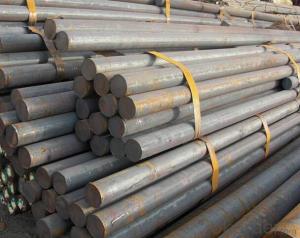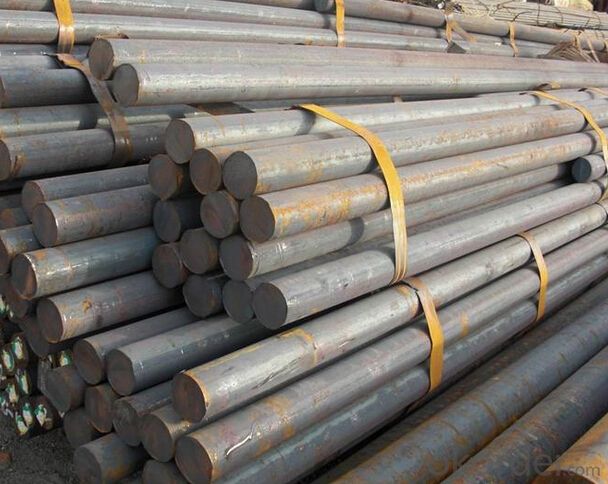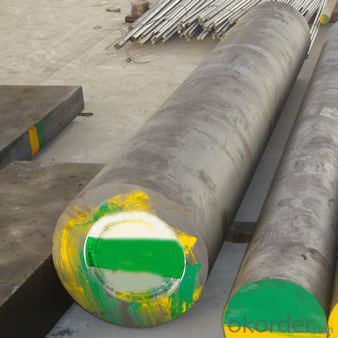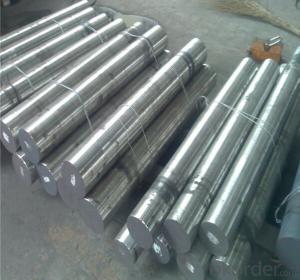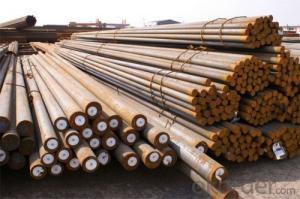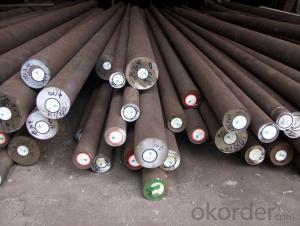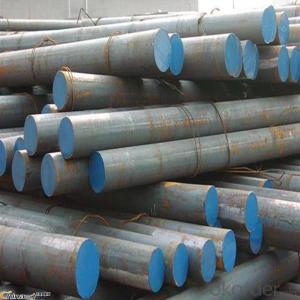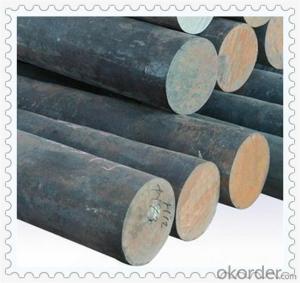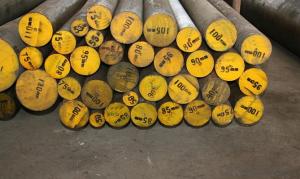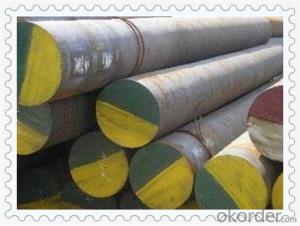Special Steel AISI 4140 Round Bar Steel
- Loading Port:
- China main port
- Payment Terms:
- TT OR LC
- Min Order Qty:
- 25 m.t.
- Supply Capability:
- 10000 m.t./month
OKorder Service Pledge
OKorder Financial Service
You Might Also Like
Specification
Chemical Composition(%)
| C | Si | Mn | Cr | Mo | Ni | P | S |
| 0.38-0.45 | 0.17-0.37 | 0.50-0.80 | 0.90-1.20 | 0.15-0.25 | ≤0.030 | ≤0.030 | ≤0.030 |
Standard
| GB | AISI | DIN | JIS | ISO |
| 42CrMo | 4140 | 42CrMo4 | SCM440 | 42CrMo4 |
Available Size
| Rolled round bar | φ20-120mm × L |
| Forged round bar | φ130-195mm × L |
Heat Treatment
| Item | Temperature℃ | Hardness |
| quenching | 840-880 | HRC32-34 |
| tempering | 580 | |
| quenching | 900 | HRC54-60 |
| tempering | 150-180 |
Characterstics
| The steel with high strength and toughness, hardenability is better also | |||||||
| After conditioning treatment quenching deformation of small | |||||||
| high fatigue limit and repeated impact resistance |
Applications: The steel is suitable for manufacturing requires a certain strength and toughness of large and medium-sized plastic mold


1, Your advantages?
professional products inquiry, products knowledge train (for agents), smooth goods delivery, excellent customer solution proposale
2, Test & Certificate?
SGS test is available, customer inspection before shipping is welcome, third party inspection is no problem
3, Payment Terms?
30% TT as deposit and 70% before delivery.
Irrevocable L/C at sight.
4, Trading Terms?
EXW, FOB, CIF, FFR, CNF
6, After-sale Service?
WE provides the services and support you need for every step of our cooperation. We're the business partner you can trust.
For any problem, please kindly contact us at any your convenient time.
We'll reply you in our first priority within 24 hours.
- Q: How is magnetic stainless steel used in the production of magnetic components?
- Magnetic stainless steel is commonly used in the production of magnetic components due to its unique combination of corrosion resistance and magnetic properties. It is often used to create parts such as magnetic housings, casings, or brackets that require both magnetic functionality and durability against rust or oxidation. The magnetic properties of this type of stainless steel allow for efficient and precise functioning of these components in various applications, including motors, generators, sensors, and magnetic assemblies.
- Q: How does special steel contribute to reducing product recalls?
- Special steel contributes to reducing product recalls by offering enhanced strength, durability, and corrosion resistance, thereby ensuring the integrity and reliability of various products. This reduces the likelihood of manufacturing defects, material failures, and premature breakdowns, which are common causes of product recalls. By using special steel in critical components, manufacturers can enhance product performance, safety, and longevity, leading to fewer recalls and improved customer satisfaction.
- Q: How does special steel contribute to sustainable development?
- Special steel contributes to sustainable development in several ways. Firstly, it is a highly durable and long-lasting material, which means that products made from special steel have a longer lifespan, reducing the need for frequent replacements and reducing waste. Additionally, special steel is often used in the construction of energy-efficient buildings and infrastructure, contributing to the reduction of energy consumption and greenhouse gas emissions. Furthermore, special steel is recyclable, allowing for the recovery and reuse of materials, reducing the demand for virgin resources and minimizing the environmental impact of steel production. Overall, the use of special steel promotes resource efficiency, environmental conservation, and economic growth, making it an important component of sustainable development.
- Q: How does special steel perform in extreme cold temperatures?
- Special steel performs well in extreme cold temperatures due to its high strength and resistance to brittleness. It retains its mechanical properties, such as toughness and ductility, which allows it to withstand low temperatures without cracking or breaking. Additionally, special steel often possesses low thermal conductivity, which helps it maintain its structural integrity and prevents it from becoming brittle in extremely cold environments.
- Q: Can special steel be used in the railway industry?
- Yes, special steel can be used in the railway industry. Special steel, such as high-strength steel or corrosion-resistant steel, can be utilized for various applications in the railway industry, including the construction of tracks, bridges, and locomotives. These types of steel offer enhanced durability, strength, and resistance to wear and tear, making them suitable for the demanding conditions and heavy loads encountered in the railway sector.
- Q: What are the properties of weathering steel?
- Weathering steel, also known as Corten steel, possesses several key properties. Firstly, it has a high resistance to corrosion, making it suitable for outdoor applications. Secondly, it forms a protective layer of rust on its surface, which not only adds to its aesthetic appeal but also acts as a barrier against further corrosion. Additionally, weathering steel is durable and strong, making it suitable for various structural applications. Lastly, it has the ability to withstand extreme weather conditions, including high temperatures and heavy rainfall, without deteriorating.
- Q: How is nitriding steel used in surface hardening processes?
- Nitriding steel is used in surface hardening processes by introducing nitrogen into the surface layer of the steel through a controlled heat treatment. This process enhances the hardness, wear resistance, and fatigue strength of the steel, making it more durable and suitable for applications that require high surface hardness and improved performance.
- Q: Can special steel be used in the manufacturing industry?
- Yes, special steel can be used in the manufacturing industry. Special steel refers to various high-quality and specialized alloys that possess unique properties, such as high strength, corrosion resistance, heat resistance, and wear resistance. These properties make special steel suitable for a wide range of applications in the manufacturing industry, including the production of machinery, tools, automotive components, aerospace parts, and construction materials.
- Q: How does special steel perform in high-temperature creep conditions?
- Special steel performs well in high-temperature creep conditions due to its high strength, excellent resistance to deformation, and superior heat resistance properties. It can withstand prolonged exposure to elevated temperatures without significant deformation or structural failure, making it an ideal choice for applications in industries such as aerospace, power generation, and petrochemicals.
- Q: What are the main properties of special steel?
- The main properties of special steel include high strength, excellent corrosion resistance, superior heat resistance, good toughness, and exceptional wear resistance. Additionally, special steel often exhibits high ductility, machinability, and weldability, making it suitable for various applications in industries such as automotive, aerospace, and construction.
Send your message to us
Special Steel AISI 4140 Round Bar Steel
- Loading Port:
- China main port
- Payment Terms:
- TT OR LC
- Min Order Qty:
- 25 m.t.
- Supply Capability:
- 10000 m.t./month
OKorder Service Pledge
OKorder Financial Service
Similar products
Hot products
Hot Searches
Related keywords
